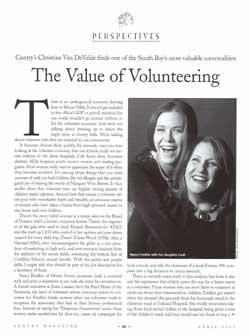Gentry's Christine VanDeVelde discovers one of the South Bay's most valuable commodities
There is an underground economy thriving here in Silicon Valley. It doesn't get included in the official GDP or payroll statistics, but our world wouldn't go around without it. It's the volunteer economy. And we're not talking about dressing up to dance the night away at charity balls. We're talking about volunteer jobs that are essential to our community.
It becomes obvious fairly quickly, for example, once you start looking at the volunteer economy, that our schools could not survive without it -- let alone hospitals, Cub Scout dens, homeless shelters, AIDs hospices, youth mentor centers and reading programs. Most women really start to appreciate the scope of it when they become mothers. It's among those things that you were unaware of until you had children, like nut allergies and the unmitigated joy of sharing the words of Margaret Wise Brown. In fact, studies show that volunteer rates are highest among parents of children under eighteen. Around here that means a volunteer talent pool with remarkable depth and breadth, an awesome reserve of women who have taken a hiatus from high-powered careers to stay home and raise children.
There's the pony-tailed woman in a tennis skirt on the Board of Trustees who's a former corporate lawyer. There's the organizer of the gala who used to head Human Resources for AT&T and the start-up CEO who cashed in her options and now drives carpool for every field trip. There's Elaine Wood of Palo Alto, a Harvard MBA, who circumnavigated the globe as a vice president of marketing in high tech, and now transacts business from the sidelines of the soccer fields, overseeing the bottom line of Castilleja School's annual benefit. With the polish and people skills, I might add, that should be part of the job description for a Secretary of State.
Nanci Fredkin of Monte Sereno possesses both a convivial style and utter competence at any task she turns her attention to. A former executive at Estee Lauder, she's the Pearl Mesta of the Peninsula, the kind of volunteer whom everyone rushes to volunteer for. Fredkin thinks women often use volunteer work to recapture the autonomy they had in their former professional lives. Instead of taking the "Desperate Housewives" route, these women make sandwiches for shut-ins, create ad campaigns for local schools, and talk the chairman of a local Fortune 500 company into a big donation to cancer research.
There is certainly some truth in that analysis, but there is also one life experience that reliably paves the way for a future career as a volunteer. Those women who are most likely to volunteer as adults are those who volunteered as children. Fredkin got started when she donated the proceeds from her lemonade stand to the children's ward at Oakland Hospital. She vividly remembers taking those hard-earned dollars to the hospital, being given a tour of the children's ward, told they would use her funds to buy a new toy for the children, and thanked for her efforts. "Now clearly, volunteers at a hospital wouldn't take that kind of time with a kindergartener," says Fredkin. "But at the time, I had no appreciation of the behind-the-scenes work my mother must have done to model the impact that volunteer work has." It was a life lesson she never forgot.
As parents, we give our time and money in efforts to which we have a deep-seated connection. It doesn't matter whether it's brand-name causes -- like Packard Children's Hospital, College Track, Cure Autism Now, the American Cancer Society, and Valle Monte League – or coaching a Little League team, reading aloud at the children's library or serving hot lunch at the elementary school. We live in a time and place with many opportunities for generosity. But to insure these causes continue to flourish, maybe the most important job we can volunteer for is raising our children in the tradition of giving back. Whether it's serving supper in a soup kitchen, collecting clothes for battered women or donating the proceeds from a lemonade stand, creating lifelong volunteers is an investment in the future of this thriving economy our communities depend on.




